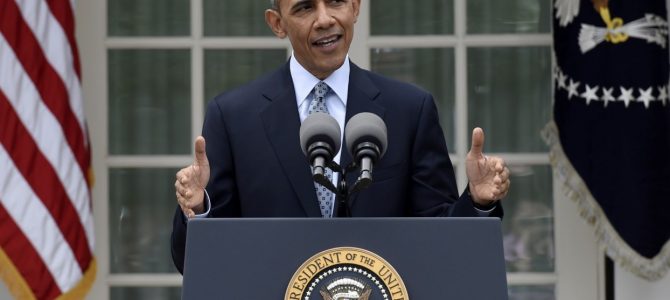
What if Donald Trump had unilaterally shut down every investigation into Russian espionage, released over 20 suspected Russian spies, struck a deal to get rid of sanctions against Russia—in return for honoring deals that had been signed years before—and then lied to the American people about the entire episode?
That’s the Obama Administration’s Iran deal. It might have been the first time the United States has offered extensive concessions to a nation that has continued to destabilize its interests, for nothing in return. But Barack Obama didn’t just support Iran’s position over our allies like Israel (no surprise there, considering his antagonism) or Sunni nations—he supported it ahead of his own Justice Department’s 30-year counterproliferation efforts.
According to an over 8,000-word investigation by Politico, Obama’s efforts to placate Iran includes releasing genuine spies (not the type we see behind every bowl of borscht these days) to a terror-supporting theocracy that has American blood on its hands and threatens the stability of the entire Middle East. Obama released Iranians who were allegedly part of an “illegal procurement network supplying Iran with U.S.-made microelectronics” that would help create surface-to-air and cruise missiles. Information that will come in handy. In seven years, “all the sanctions, even arms embargoes and missile-related sanctions… would all be lifted,” Hassan Rouhani correctly noted during the post-deal Iranian celebration.
According to Politico, the Justice Department dropped charges and international arrest warrants against 14 men, most of them alleged spies. At least one of them sought supplies for Iran’s proxy Hezbollah, a Justice Department-designated terrorist organization that is also allied to Bashar al-Assad. Another one of these men was serving an eight-year sentence for “conspiring to supply Iran with satellite technology and hardware.” And Seyed Abolfazl Shahab Jamili had been charged with participating in conspiracy to procuring “thousands of parts with nuclear applications” that Iran supposedly didn’t care about anymore.
In the 2016 prisoner swap, the administration claimed that it was able “winnow” a big ask “down to these seven individuals, six of whom are Iranian-Americans.” This was a lie of omission, not to mention a distraction.
At the time, we already knew that at least two released suspects had been accused of lending logistical support to terrorist groups. What we didn’t know, as Politico reports—a piece that, unlike many these days, is buttressed by on-the-record sources—is that Justice and State Department officials were subsequently denied or delayed requests for prosecutors, and their ongoing investigations to ferret out spies were actively undermined. Obama essentially shut down any investigation that would make Iran angry.
Then the administration, including the president, lied about the deal they had struck over and over again. It’s true that Obama lied with far more sophistication than our current president. But democracy dies in “echo chambers” created by unqualified foreign policy aides obsessed with making the Islamic Republic into a regional superpower.
On top of all of this, you’ll remember Obama’s foot soldiers Tommy Vietor, Dan Pfeiffer, et al., smeared anyone who had reservations about the deal by pushing the ludicrous false choice that it was either Obama’s way or war. Though, some of the slimmest attacks were reserved for Chuck Schumer, whose tepid pushback against the deal had people intimating he was an Israel-firster. (Which is ugly, but I suppose more moral than being an Iran-firster.)
Obama went as far as accusing anyone who opposed the deal of being in “common cause” with hardline Islamists in Iran. This would be tantamount to accusing Obama of being in “common cause” with Saddam Hussein when he opposed the Iraq war. Of course, the GOP (which did exceptionally little to stand in the way of Obama) made the case that the nuclear deal was far too favorable to Iran. The hardliners opposition in Iran was predicated on the opposite case—though, once Americans began airlifting them pallets of cash, they probably felt better about the arrangement.
In fact, using the administration framing, it would be correct to say that Obama was in “common cause” with both Putin and Syrian President Bashar al-Assad. Both of them were in favor of the Iran deal. “We are satisfied that the solution found is based on the principle of phasing and mutuality which our country has been consistently supporting at every stage of these complicated negotiations,” Putin said at the time. Assad cheered the deal, before adding that he was confident his ally in Iran will now step up its efforts to back “just causes” (what are those, one wonders?).
What is clear is that Iran deal remained the predominant concern of President Obama in his second term. Former ambassador Frederic C. Hof recently accused the former president of “passivity” on both the military and rhetorical front during the Syrian war for the sake of preserving the Iranian deal:
In his August 25, 2016 press briefing Mr. Earnest was asked about the administration’s failure to protect Syrian civilians in the face of what he described as the Assad regime’s ‘unconscionable use of violence against civilians.’ He clarified, using language that defines vacuity, the administration’s policy as follows: ‘But our approach to the Assad regime has been to make clear that they’ve lost legitimacy to lead that country.’ Claiming, in a sentence that defines wishful thinking, that ‘Russia shares this assessment,’ Earnest suggested that the way forward toward ending mass murder is for Moscow to live up to its commitments and rein-in its homicidal client. He did not mention Russia’s own growing portfolio of war crimes in Syria.
It seems increasingly plausible that Obama was hamstrung to act in Syria by the overriding need to avoid upsetting the Iranians (and Russians). That alone should be enough to count the Iran deal as a massive disaster. Yet, considering how little we know about what was in the deal, who knows what ugly things we’ll find out in the coming years.








